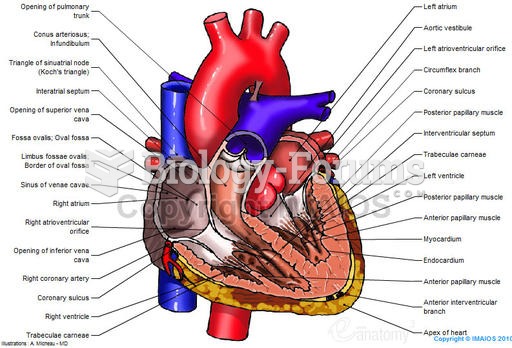Answer to Question 1
Correct Answer: 1,2,3
Rationale 1: Ventricular hypertrophy occurs as a compensatory mechanism to heart failure.
Rationale 2: One of the fastest homeostatic responses to diminished cardiac output is activation of the sympathetic nervous system (SNS). The increased heart rate resulting from sympathetic activation is a normal compensatory mechanism that serves to increase cardiac output.
Rationale 3: When cardiac output in a client with HF is diminished, blood flow to the kidneys is reduced.
Rationale 4: Vasopressin (antidiuretic hormone), which is elevated in HF clients, causes fluid retention and worsens this condition.
Rationale 5: Two pro-inflammatory substances, tumor necrosis factor (TNF) and interleukin, are found in high levels in clients with HF and are associated with a poor prognosis.
Global Rationale: Ventricular hypertrophy occurs as a compensatory mechanism to heart failure. One of the fastest homeostatic responses to diminished cardiac output is activation of the sympathetic nervous system (SNS). The increased heart rate resulting from sympathetic activation is a normal compensatory mechanism that serves to increase cardiac output. When cardiac output in a client with HF is diminished, blood flow to the kidneys is reduced. Vasopressin (antidiuretic hormone), which is elevated in HF clients, causes fluid retention and worsens this condition. Two pro-inflammatory substances, tumor necrosis factor (TNF) and interleukin, are found in high levels in clients with HF and are associated with a poor prognosis.
Answer to Question 2
Correct Answer: 1
Rationale 1: Increased daily weight is a sign that a client could be decompensating. Daily weights are an effective means of monitoring for heart failure symptoms.
Rationale 2: Shortness of breath is not present in all stages of heart failure. Moreover, many clients self-treat shortness of breath by doing progressively less activity, and therefore never experience shortness of breath until late in the disease.
Rationale 3: Clients with heart failure often experience orthopnea, which is relieved by sitting up. Sleeping on three pillows can mask orthopnea.
Rationale 4: High heart rate and blood pressure are compensatory mechanisms and signs that the client still might be experiencing heart failure.
Global Rationale: Increased daily weight is a sign that a client could be decompensating. Daily weights are an effective means of monitoring for heart failure symptoms. Shortness of breath is not present in all stages of heart failure. Moreover, many clients self-treat shortness of breath by doing progressively less activity, and therefore never experience shortness of breath until late in the disease. Clients with heart failure often experience orthopnea, which is relieved by sitting up. Sleeping on three pillows can mask orthopnea. High heart rate and blood pressure are compensatory mechanisms and signs that the client still might be experiencing heart failure.







